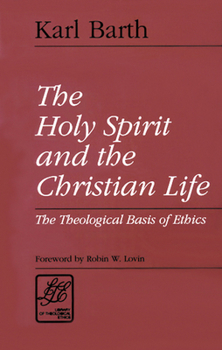The Holy Spirit and the Christian Life: The Theological Basis of Ethics
Select Format
Select Condition 
Book Overview
This rare volume provides a concise statement of the major ideas of one of the greatest Protestant thinkers of the twentieth century, Karl Barth. Divided into three parts, it presents Barth's lecture, "The Holy Spirit and the Christian Life." This work emphasizes Barth's focus on the Trinitarian character of God's self-revelation. Barth insists there is no way to get behind or beyond the fact that God is revealed to us in three distinct ways, yet...
Format:Paperback
Language:English
ISBN:0664253253
ISBN13:9780664253257
Release Date:December 1993
Publisher:Westminster John Knox Press
Length:96 Pages
Weight:0.40 lbs.
Dimensions:0.2" x 5.9" x 8.8"
Related Subjects
Christian Books & Bibles Religion Religion & Spirituality Religious Studies TheologyCustomer Reviews
2 ratings
A useful book for Barth, ethics, and pneumatology
Published by Thriftbooks.com User , 15 years ago
This short work from 1929 sits right before Barth headed to Bonn. In this period, Barth is working over his presentation of dogmatic theology, converting the abortive prolegomenon to the Christian Dogmatics in Outline into the Church Dogmatics in much the same way that he converted the Romans commentary from first to second editions. Not one stone is left on another, even though the structure is similar. There is much about The Holy Spirit and the Christian Life that connects Barth's earlier work with his later work. It represents his uncompromising sense that God cannot be known apart from God's own self-revealing action, and that this action determines faith and knowledge of God. It represents in nuce the position Barth will reach in 1931 with Fides Quaerens Intellectum, that the proper basis for organized thought about God is faith, especially the faith of the church. Here Barth is in the process of destroying natural theology and the analogia entis, a process which represents the largest change between the Christian Dogmatics and the Church Dogmatics. He is at the same time destroying German idealism and the Liberal Protestantism that follows it. This is a work that bears the fruit of Barth's sense of returning to the Reformation, bringing the Reformed confessional theology and the Patristic scholarship of his earlier studies to bear on the problems of his present theological situation. In this work, Barth is true to himself, and therefore as true to God as he can conceive of being. It is an excellent short read. Which is not to say that it is necessarily an easy read. Good Barth translation will never be easy English, and it becomes better English most of the time at the expense of Barth's complete thoughts. This is not the best of translations, but it reads like Barth. If you do not find yourself compelled to stop and think frequently through this short work, you are missing its point. This is a work that rewards investment of time and thought. It is worth that investment, not least because it is a good representative of Barth's maturing thought. I would put this on a Systematic Theology syllabus as supplementary pneumatology, and likewise it would make good material for an introductory Barth course. Besides its coursework value, this is still a highly relevant text in light of the status quo in public "Christian" ethics in religio-political America.
Read a "book" by Karl Barth in a couple hours
Published by Thriftbooks.com User , 15 years ago
This is a short book by Karl Barth. Actually it is a lecture from October 9, 1929. There are some great moments and gives you a look at his theology. It is 70 pages but almost half of that is endnotes which you can skip. I read it for Willie Jennings's Duke Divinity School course on Theology of Karl Barth (Spring 2009). If you want to read a book by Barth is a couple of hours, this might be the one. I would probably recommend God in Action: Theological Addresses as a slightly more accessible but larger slim volume by Barth. In the first section, he makes the points: the Holy Spirit is not synonymous with the human spirit (3) and we need to be very cautious before saying "Thus saith the Lord" (10). In the second section, he argues against a view that good works are synonymous with God's grace--only God judges what can be called "Christian" (37). The third section deals with the importance of the eschatological. On a theological level, Barth takes on Augustine and a Roman Catholic understanding of works in this book so if that is of interest, this would be a good thing to read.






